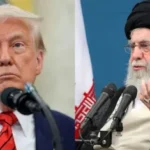
Brazil and Colombia have suggested that Venezuela hold new presidential elections to end the crisis triggered after Nicolás Maduro was declared the winner without providing sufficient evidence at the polls. The socialist leader’s claim to have won re-election, which is not recognized by the United States, the EU and most Latin American countries, was followed by a deadly crackdown on protesters in the days after the vote.
However, the proposal to rerun the vote was rejected by Venezuelan opposition leader María Corina Machado. The opposition claims that its candidate, Edmundo González, was the real winner, with a margin of more than two to one, and has published thousands of voting receipts online.
“The election has already happened,” Machado said at a press conference on Thursday. “If [Maduro] If we don’t like the results, let’s hold a third election?”
Venezuela’s National Electoral Council, controlled by Maduro’s allies, has not published a detailed analysis of the results since proclaiming Maduro the winner last month.
Brazilian President Luiz Inácio Lula da Silva said on Thursday that he has not yet accepted Maduro’s alleged victory, saying that “he [Maduro] He knows he owes an explanation to Brazilian society and to the world.” He reiterated his call for the release of voting data, but also suggested in a radio interview that there could be other ways to resolve the impasse, including calling new elections: “You can form a coalition government, call in the opposition. Many people who are in my government did not vote for me.”
Colombia’s leftist president, Gustavo Petro, has called for new elections, a transitional coalition government, national and international amnesties, and the “lifting of all sanctions against Venezuela.” “An internal political agreement in Venezuela is the best path to peace,” he wrote in X.
US President Joe Biden was also asked by reporters at the White House on Thursday whether he supported new elections in Venezuela, to which he replied “yes” without providing further details. A National Security Council spokesman later clarified that Biden “was referring to the absurdity of Maduro and his proxies not being honest about the July 28 elections.”
“The United States reiterates its call for the will of the Venezuelan people to be respected and for discussions to begin on a transition back to democratic norms,” the spokesperson added.
Brasília and Bogotá, whose presidents have historically been sympathetic to Venezuela’s leftist government, are pushing for greater transparency from Caracas as they seek to foster mediation between Maduro and the opposition. That approach contrasts with the harsher condemnations from many Western nations.
Mexico was initially involved in the initiative, but its leftist president, Andrés Manuel López Obrador, said this week that he would not participate in the talks for now.
“I interpret the interest of these countries as stability, but keep in mind that stability does not mean a democratic transition,” said Ryan Berg, director of the Americas program at the Center for Strategic and International Studies. “The dark side of all this is that, in theory, stability could be achieved through repression. A country could be stable, but only stably repressed.”
In power since 2013, Maduro has overseen the collapse of Venezuela’s oil-dependent economy, increased repression and the exodus of nearly a quarter of its population. He has portrayed the unrest as part of a U.S.-led “fascist” and “counterrevolutionary” coup attempt backed by billionaire Elon Musk and Western social media companies.
The United States congratulated Gonzalez on winning the most votes, although it stopped short of recognizing him as president-elect. Argentina, Costa Rica, Ecuador, Panama, Peru and Uruguay also recognized Gonzalez’s victory, while Maduro’s allies in Cuba, Russia, Iran and China were quick to congratulate his re-election.
A group of 20 former US officials and diplomats signed an open letter to US Secretary of State Antony Blinken on Wednesday calling on the Biden administration to take a tougher stance on Maduro.
“The diplomatic efforts of Brazil, Colombia, and Mexico are notable, but there is no substitute for U.S. leadership mobilizing like-minded democratic governments to pressure the regime to respect the election results and accept a timely transition of power,” the group wrote.
Via Financial Times
Source: https://www.ocafezinho.com/2024/08/15/brasil-e-colombia-pedem-novas-eleicoes-na-venezuela/

